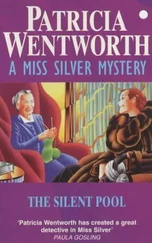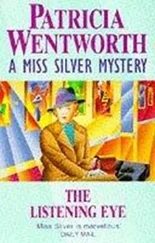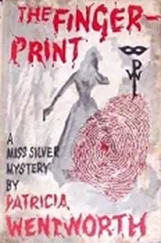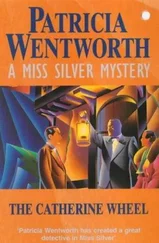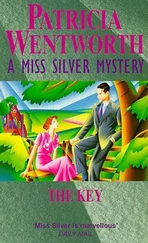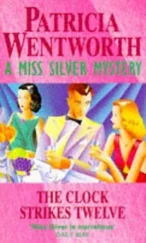“Who did, then?” Then in the harshest voice of all, “I don’t care if she’s Molloy’s daughter fifty times over, if she heard what Four said about The Process, she must go.” Go where?
There was something cold and wet touching her shoulder. The cold seemed to spread all over her. Now her father was speaking. She had never heard his voice quite like that before. And now the man in the fur coat, the one who had given her the glass of water:
“Yes, certainly, elimination if it is necessary. We’re all agreed about that. But let us make sure.” His voice had quite a gentle sound, but Renata’s heart began to beat with great thuds.
“Miss Molloy,”—he was speaking to her now, and she opened her eyes and looked at him. His face was of a clear, even pallor. His eyes, light blue and without noticeable lashes, looked straight into hers. The veil was gone from them. They held a terrifying intelligence.
Renata sat up. The crowd of men had cleared away. She, and her father, and the man in the fur coat were in an angle formed by the table and the black screen, which had been drawn close around them. Her father sat between her and the fire. His head was turned away, and he drummed incessantly on the table with the fingers of his right hand. Beyond the screen Renata could hear movements, and it came to her that the other men were there, waiting. The man in the fur coat spoke to her again. His voice was pleasant and cultivated, his manner reassuring.
“You are better now? Please don’t be frightened. I am a doctor; your father will tell you that. Being wakened suddenly like that gave you a shock, but you are better now.”
“Yes,” said Renata. She wished that her heart would stop beating so hard, and she wished that the man in the fur coat would stop looking at her.
“Now, Miss Renata, I am your doctor, you know, and I want you to answer just a few questions. You have walked in your sleep before?”
“Yes,” said Renata—“oh yes.”
“Often?”
“Yes.”
“What was the first time?”
“I think—I think I was five years old. They found me in the garden.”
Molloy let out a great breath of relief. If she had forgotten, if her account had differed from his—well, well, their luck was in.
There was a whispering from behind the screen. Number Two frowned.
“And the last time?”
“It was at school. I walked into another dormitory and frightened the girls.”
The man in the fur coat nodded. “So your father said.” And for a moment Molloy stared over his shoulder at him. “And to-night? Do you dream on these occasions?”
Renata was reassured. Every moment it was more like an ordinary visit to a doctor. She had been asked all these questions so often. Her voice no longer trembled as she answered. “Yes, I dream. I walk in my sleep because of the dream; now to-night....”
“Yes, to-night?”
“I dreamt I was back at school, and I thought I heard talking in the next dormitory. You know we are not allowed to talk, and I am—I mean I was a prefect. So I got up, and went to see what was the matter, and some one pulled the screen away, and there was such a light, and such a noise.” She put out a shaking hand, and Number Two patted it kindly.
“Very startling for you,” he said. “So you opened the door and came in and heard us all talking. Can you tell me what was being said?” His hand was on Renata’s wrist, and he felt the pulses leap. She spoke a shade too quickly:
“I don’t know.”
“Perhaps I can help you. Your father, you know, travels for a firm of chemists, a firm in which I and my friends are also interested. We were discussing a new aniline dye which, we hope, will capture the markets of the world. Now did you hear that word—aniline—or anything like it? You see I want to find out just what woke you. What tiresome questions we doctors ask, don’t we?”
He smiled, and Renata tried to collect her thoughts. They were in great confusion.
Aniline—annihilate—the two words kept coming and going. If her head had been clearer she would almost certainly have fallen into the trap which had been laid for her. Molloy stopped drumming on the table and clenched his hand. With all his strength he was praying to the saints in whom he no longer believed. Behind the screen twenty-three men waited in a dead silence. Renata was not frightened any more, but she was tired—oh, so dreadfully tired. Annihilate—aniline—the words and their similarity of sound teased her. She turned from them with a little burst of petulance.
“I didn’t hear anything like that. Oh, do let me go to bed! I only heard some one call out....”
“Yes?” said Number Two.
“He said, ‘The door, the door!’ and then there were all those lights.”
Table of Contents
Jane Smith sat on a bench in Kensington Gardens. Her entire worldly fortune lay in her lap. It consisted of two shillings and eleven pence. She had already counted the pennies four times, because there really should have been three shillings. She was now engaged in making a list in parallel columns of ( a ) those persons from whom she might seek financial assistance, and ( b ) the excellent reasons which prevented her from approaching them.
Jane had a passion for making lists. Years and years and years ago Mr. Carruthers had said to her, “My dear, you must learn to be businesslike. I have never been businesslike myself, and it has always been a great trouble to me.” And then and there he and Jane had, in collaboration, embarked upon the First List. It was a thrilling list, a list of toys for Jane’s very first Christmas tree. Since then she had made lists of her books, lists of her clothes, shopping lists, and an annual list of good resolutions.
Jane stopped writing, and began to think about all those other lists. She had always showed them to Mr. Carruthers, and he had always gazed at them with the same vague benignness, and said how businesslike she was getting.
Dear Cousin James—Jane was rich instead of poor when she thought about him. She looked across at the trees in their new mist of green, and then suddenly the thin April sunshine dazzled in her eyes and the green swam into a blur. Cousin James was gone, and Jane was alone in Kensington Gardens with two-and-elevenpence and a list.
She opened and shut her eyes very quickly once or twice, and fixed her attention upon ( a ) and ( b ) in their parallel columns. At the top of the list Jane had written “Cousin Louisa,” and the reason against asking Cousin Louisa’s assistance was set down as, “Because she was a perfect beast to my darling Jimmy, and a worse beast to me, and anyhow, she wouldn’t.”
In moments of irreverence the late Mr. Carruthers— the Mr. Carruthers, author of five monumental volumes on Ethnographical Differentiation—had been addressed by his young ward and cousin as “darling Jimmy.”
Professor Philpot came next. “A darling, but he is sitting somewhere in Central Africa in a cage learning to talk gorilla. I do hope they haven’t eaten him, or whatever they do do to people when they catch them.”
It will be observed that Miss Smith’s association with the world of science had not succeeded in chastening her grammar.
Jane’s pencil travelled down the list.
“Mr. Bruce Murray. In Thibet studying Llamas.”
“Henry”—Jane shook her head and solemnly put two thick black lines through Henry’s name. One cannot ask for financial assistance from a young man whose hand one has refused in marriage—“even if it was three years ago, and he’s probably been in love with at least fifteen girls since then.”
“Henry’s mamma—well, the only time she ever loved me in her life was when I refused Henry, so I should think she was an Absolute Wash Out—and that’s the lot.”
Читать дальше


